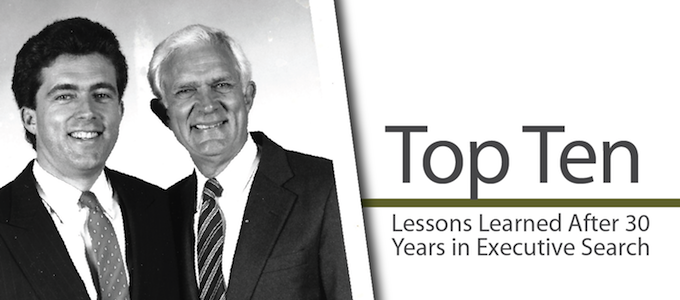Top Ten Lessons Learned After 30 Years in Executive Search
RESOURCE LIBRARY

This fall, as Durakis Executive Search celebrates 40 years in the executive search field, I wanted to take time to look back, reflect, and distill some of the lessons learned over the years. When my father, Charlie Durakis, opened the first DES office and taught me the ropes of search over the next few decades, I knew we were doing something important… and something really difficult.
Although certainly not exhaustive (maybe I’ll do a part two to this blog), here is my list of the top ten lessons I’ve learned in executive search over the last 30 years.
10. The Internet is great and the tools fantastic, but timing has generally not been greatly impacted. A great search still takes about the same amount of time now as it did 30 years ago.
9. Communicating “live ” is incredibly important. Social media and email are great tools but are truly no substitute for a live call or in-person meeting.
8. Have patience when beginning a search. No matter how important or critical the client tells you the position is to their organization, you have to let the search process work its magic. The process is powerful and it works – but it takes time. In other words, we must be “patiently impatient. ” Impatient because we must always have a sense of urgency, but patient to let the process work its magic.
7. Much to the dismay of many, you really don’t know after one minute of an interview if the candidate is the right one or not. The best candidates sometimes need to “warm up ” in an interview and not until midway (or even deeper into the interview) do their true colors of greatness show up.
6. Success in a search has very little to do with having a depth of knowledge of an industry. Success is about grit, perseverance, and commitment to get it right.
5. You cannot underestimate the importance of developing relationships with clients.
4. Never present marginal candidates. Quality candidates are a must.
3. Always assume that another candidate is needed. Even after things “look promising. ”
2. Constantly cultivate your network, your CRM, your relationships, your skills. Don’t put it in neutral.
1. Don’t assume that the best candidate will come from the industry that’s looking to hire. Sometimes the best candidates come from different industries or sectors.
